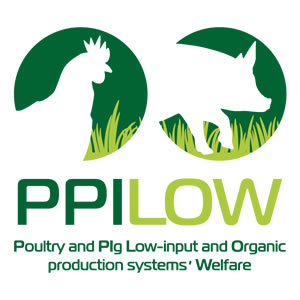Challenge
PPILOW combines multi-actor and co-creation approaches joining the efforts of producers and consumer associations, other production chain actors and scientists to identify and understand the barriers to laying hens, broilers and pig welfare and to validate practical solutions for improving animal welfare within organic and low-input outdoor production systems. With this perspective, PPILOW will:
1) Develop an inventory of practices and assess the citizen/consumer and production chain expectations through the knowledge acquired from previous projects (e.g. Q-pork chain, AviBio, OVALI, Welfare Quality©, EBENE©, FreeBirds…) and through the focus groups and workshops fostering dialogue between actors of the field, including producers and consumer associations, that will be partners or members of the National Practitioner Groups and European Multi-actor Board.
2) Build up shared welfare self-assessment & benchmarking tools for and with farmers. Several previous projects, such as Welfare Quality©, EBENE© or AWIN have proposed protocols to evaluate welfare, but they are rarely implemented on the farms in the participating countries, and more generally in the EU. PPILOW will use this information and develop or adopt practical self-assessment tools throughout this project in co-creation with the end-users (through National Practitioners Groups). It intends to apply and evaluate the effects of such tools from birth/hatching to the depopulation phase.
3) Co-create and experimentally test innovative and/or bottom-up production practices likely to improve animal welfare and robustness and more generally the sustainability of production systems. Especially, the PPILOW project will investigate how chicken behaviour and temperament could be involved in outdoor area exploration, which has not been investigated yet, and how early life experience will affect later adaptive capacities. The project will also evaluate the potential of using non-invasive methods applied on the chicken egg to detect embryo gender at early development stages. It will assess the interest of building new technical itineraries to rear both sexes in sustainable business models such as rearing dual-purpose offspring able to produce both eggs and meat. In pigs and poultry, the use of selection tools, optimized housing techniques and/or genetic × rearing system combinations will be proposed for improving animal robustness, especially for outdoor rearing, and for limiting aggressiveness and stress-related behaviours provoking lesions in systems avoiding beak trimming in poultry and piglet castration. In both species, nutritional and enrichment strategies will be tested (e.g. live insects or inclusion of plant extracts in the feed or available outdoor) to limit altered/aggressive animal behaviours or parasitic infestation. These innovations and potential additional ones emerging during the project will be discussed within National Practitioners Groups including the expertise of farmers, other production chain actors, scientists and the expectations of the European citizens/consumers in order to find consensus on additional levers to investigate experimentally and, to test the most promising ones on-farm.
4) Evaluate through multi-criteria analyses the potential of proposed levers for application (including the fine characterisation of the meat/egg products resulting from the proposed levers) and implementation on farm. Indeed, the PPILOW project will result in a multi-criteria assessment of animal welfare improving practices according to the One Welfare concept recruiting environmental, social and economic criteria.
The One Welfare concept that will be used in the context of the PPILOW project embraces all sustainability goals usually allocated between environmental, social and economic dimensions with specific emphasis on animal and human welfare.

Correspondence between Sustainability and One Welfare concepts with integrated dimensions
The One Welfare concept that will be used in the context of the PPILOW project embraces all sustainability goals usually allocated between environmental, social and economic dimensions with specific emphasis on animal and human welfare.
The PPILOW project will also evaluate the contribution of the levers to a new social consensus on rearing practices to be recognized by regulators in Europe. The project will propose a deep economic assessment in pig and poultry productions for promising levers (e.g. the use of fertile male eggs, dual-purpose male crossbred chickens, genetic/housing solutions for piglet survival, pork meat issued from organic non-castrated males…) and economically viable business models.

